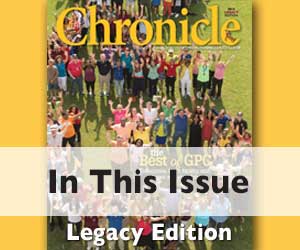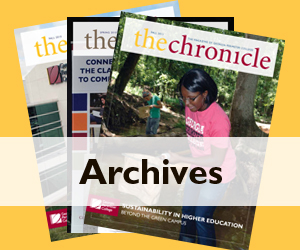
Sage Hylton says GPC tutor Gail McCain was his “guardian angel,” helping him to become a college student after years away from education. (Photo by Bill Roa)
Students with Disabilities Find Support at GPC
by Stell Simonton
When Sage Hylton applied to Georgia Perimeter College last spring, he was unsure how his application might turn out.
The 33-year-old had been out of school for more than 10 years, and he was worried about his performance on placement tests required for admission. While he felt good about his writing and reading skills, “I have a diagnosed severe learning disability in mathematics that went untreated by my public high school,” he says.
At first, his experience seemed to justify his fears. He failed to score high enough on the math portion of the exam to gain entrance. He hit the books and came back to try a second time, but again he scored too low.
Things changed, however, after the testing center director at GPC’s Dunwoody Campus—seeing his distress—guided Hylton to the college’s Learning and Tutoring Center. Today, Hylton is enrolled in fall classes and excited about his future.
College, with its independent culture and elevated rigor of studies, can be a thrilling but trying experience for many students. For those who have physical, mental or learning disabilities, the demands can seem particularly formidable.
Georgia Perimeter College—through its small class sizes, professor involvement, access to tutoring, personal attention and its Disability Services—removes barriers and provides the tools students need to succeed in higher education.
Kimberly Minor understands that well.

Kim Minor, left, says GPC counselor Ca Trice Glenn provided valuable support during Minor’s studies at the college. (Photo by Bill Roa)
Minor, a 2013 graduate of GPC, remembers sitting in GPC’s admissions office. She recalls shaking her head when offered disability services. She didn’t want the help. She was recovering from a serious illness, but she wanted to make it on her own.
A year later, her grade point average had sunk. Though she was enjoying an internship with a magazine, she was not managing her classes well. She found herself on academic probation, and it felt like a failure. She withdrew for a time.
Minor returned to class several semesters later, and this time she was ready to hear about assistance.
When she graduated last spring, Minor left a string of successes in her wake. She had accepted an invitation to speak at The Carter Center, receiving accolades for her moving and personal story about mental illness. She had helped organize a new campus organization at Georgia Perimeter, and she had built her GPA back to a high B. The services, environment and support available at Georgia Perimeter—along with Minor’s own considerable talent and determination—helped her get back on track and carve out her future.
“Everyone there is really supportive,” she says, explaining that there is an “overall warmth of the school. … It’s very easy to navigate.”
Georgia Perimeter College’s mission to provide students access to a college education extends beyond offering convenient locations, flexible hours and less restrictive admission requirements. Small class sizes, faculty who personally teach and meet with their students and a broad array of support services all play a vital role in student success. They are particularly important in helping students who have a disability. Through personalized accommodations, students with a disability are given an equal opportunity to succeed in college.
More than 540 Georgia Perimeter students—about 2 percent of the student body—are served by GPC’s Disability Services. Almost half of those students have a diagnosed learning disorder, of which ADHD (Attention Deficit Hyperactive Disorder) is the most prevalent, says Disability Services director Bonnie Martin. Twenty-five to 30 percent have psychiatric or psychological illnesses. About 8 to 10 percent have systemic or chronic medical issues, such as severe diabetes, chronic fatigue syndrome or cystic fibrosis. A small but significant number have an Autism Spectrum Disorder.
The goal of Disability Services is to provide access for students with disabilities, in keeping with Georgia Perimeter’s mission to provide access to higher education. The center also ensures that federal mandates are satisfied by providing required equal access to all curriculum and campus activities for students who identify themselves as having a disability.
At the beginning of the semester “we meet one-on-one and find out how the student is doing and what may be a barrier to their access,” Martin says.
Each GPC campus has a Disability Services office and a coordinator to arrange accommodations. Students must identify themselves to the office as someone with a disability and provide documentation of their disability. The coordinator uses the documentation as a guide and works with the student to set up appropriate accommodations for that individual.
The student should return to the coordinator at the beginning of each semester to review and update accommodations. Accommodations are outlined in a letter that is the official notification to a faculty member. The student takes the letter to the faculty member and discusses how accommodations will be arranged. A student’s success depends on his or her ability to take advantage of compensatory strategies and follow through with them, Martin says. The goal is self-reliance.
In the 1980s, Disability Services mainly served students with physical disabilities. In the mid-1980s and through the 1990s there was a spike in students with ADHD and learning disorders. Now, the office is seeing an increase in the number of students with psychiatric issues such as severe bipolar disorder and schizophrenia, possibly because treatment of those conditions has become more sophisticated, allowing more to attend college, Martin says. In recent years, the college has seen a significant number of military veterans who have mental and emotional challenges such as post-traumatic stress disorder, she says.
Martin recommends that some students with disabilities take a lighter course load due to the impact of the disability on learning, retention and recalling information. Those students require more study time to master the content. For some, nine credit hours can be considered full time, she says, because it’s important that those students not overload themselves.
“A lot of students don’t even know they have a learning disorder until they get into college,” Martin says. Their lives were more structured in high school, she says, whereas in college they must create their own structure. College courses are more demanding than high school, and students find themselves facing a tough challenge. Another group who may need accommodations for the first time in college are those with a recent onsent of mental illness. The most common age of onset for certain mental illnesses is 18-26, she says.
Georgia Perimeter is a good place for these students, Martin says. Students can live at home and have the support of their families. In addition, GPC professors know how to accommodate students with a variety of learning styles, Martin says.
Erik Moton, who uses a wheelchair, studied journalism at GPC. When he began, he met with Martin to see if his classes were accessible and, when some weren’t, she arranged for their location to be changed.
Moton, who continued his studies at Georgia State University, has since received a degree in English literature and self-published a book, “Opened Windows.”
“It’s about my life thus far as a disabled man,” he says.
Olivia Dorsey, 23, of Stockbridge entered Georgia Perimeter in 2010. She’s studying social work and takes three classes per semester. Her plan is to attend Georgia State University for her bachelor’s degree, with the eventual goal of earning a master’s. She hopes to work as a school counselor or in other social work involving children.
Dorsey was 6 months old when she was partially paralyzed in a car accident. She can write and type, but her pace is not fast enough to take notes in class. At GPC, another student in the class shares notes with Dorsey. She is also provided with an assistant called a scribe who writes in class assignments for her. “I tell them what to write,” she says.
“I can’t reach my book bag,” Dorsey says, so the scribe helps pull out materials and open books.
For exams, Dorsey receives extra time and takes the tests in a separate room, where she tells the scribe which answers to mark or dictates short answer and essay responses.
Andre Gayle, who graduated from GPC in May with an associate degree in social work, also used the services of a scribe and a notetaker. “I can write but not fast enough to catch everything the professor is saying,” he says. He also gets extra time to take tests.
Gayle has a form of cerebral palsy that causes muscles to stiffen, and he walks more slowly than most people.
Since graduation, Gayle has been volunteering at an assisted living facility. “I want to get some work experience in,” he says. He plans to pursue a bachelor’s degree in social work.
Accommodation comes in a variety of forms. The most common accommodation given to students with disabilities is to extend the time they are given to take tests. For many, their disability affects their ability to recall information, to process and to formulate responses. Having extra time allows them to perform at their ability level.
Students also may receive permission to record lectures. Blind students can be provided assistants for lab work to describe what other students are observing visually. Students who are deaf or hard of hearing can receive a sign language interpreter or in-class captioning on a computer screen to have full access to the lecture or class discussions. Students with reading disorders can use software that “voices” the text while they read it, helping them to comprehend and better retain the content.
In addition, all GPC students—whether they have disabilities or not—can obtain help from the Learning and Tutoring Center and the counseling office.
One type of assistance—the assignment of a coach—was particularly valuable to Minor.
Prior to attending GPC, Minor was a freshman at Clark Atlanta University. She was taking a heavy course load and working hard at an internship at Morehouse School of Medicine.
One day things began to look different to her. Her normally friendly and open personality had changed. She began to feel that her co-workers were out to get her. So she announced she was quitting her internship and went home to her parents in Lithonia. There, she became manic, talking nonstop.
She and her family soon discovered that Minor had experienced a chemical imbalance and was in the middle of a psychotic break, a state of being out of touch with reality. Symptoms can include visual or auditory hallucinations and paranoid delusions.
When Minor looked into mirrors she saw monsters. When she tried to read a book, she couldn’t see a line of type. Sometimes her eyes and her mind raced ahead, unable to slow down long enough to grasp words. She was convinced there was a conspiracy against her.
With immediate psychiatric treatment, including medication, her symptoms gradually subsided. Her psychiatrist said that in the stress of her freshman year, she had slipped into a depression that had triggered a psychotic break. She worked with a counselor to make sense of what had happened.
When Minor returned to GPC, she was given extra time to take tests. But the big change came when she sat down with an academic coach, who worked with her to color-code a schedule showing times to attend class, study and even to eat and sleep. This structuring worked wonders, says Minor, who says she had to learn to guard her time.
A GPC counselor, Ca Trice Glenn, also made a big impression on Minor. Glenn provided continued support, even attending special events for Minor that were held off campus.
Minor’s experience led her to become outspoken in mental health advocacy. She helped establish a GPC branch of Active Minds, a national organization that raises awareness of mental illness among college students and combats the stigma that surrounds it. As president of the group, she spoke to classes, brought speakers to campus and made presentations at other colleges, including Morehouse and Emory University.
She has been invited to speak at the Carter Center twice, and—in the spring—she had dinner at an event with former First Lady Rosalynn Carter. And, she has continued her work since leaving GPC, recently making a presentation at Spelman College.
The assistance Minor received at GPC enabled her to become an advocate for others, she says.
Minor also has fared well on other fronts. She has done freelance reporting for the Center for American Progress as part of its Generation Progress project, a campus program in which young people report on issues that affect them. Her first article was on health care.
Hylton’s experience, though different, made him grateful for GPC and the support he received. Hylton entered GPC this fall to earn a certificate in sign language interpreting, and he credits Georgia Perimeter and a caring tutor with being accepted into college to pursue his dream.
After Hylton failed the math portion of his placement tests, the testing center director walked him over to the tutoring center, where he met Gail McCain.
“She was just so kind and patient,” Hylton says. Her combination of adept tutoring—adapting her method as they went along—and patient support made all the difference for him.
Hylton felt so grateful he sent a letter to the college praising McCain.
“She was and is my GPC guardian angel, helping me to achieve the success I needed to move from a prospective student to an accepted student,” Hylton wrote. “I cannot state enough how incredible my experience with the tutoring center, staff and Gail has been.”
“I could not have done it without Gail McCain,” he says. “I am really set up to be successful.”
View a video message from GPC alumna Kim Minor.









No Comments on “Expanding Access”